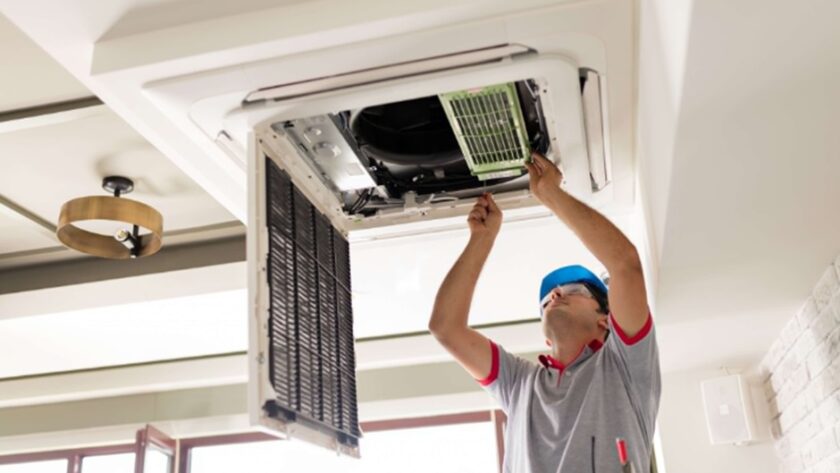Air conditioning is more than just a commodity; it’s become a necessity for many households around the world. Whether it’s battling the sweltering heat of summer or ushering in the cool comfort of a temperate room, air conditioning systems play a significant role in our day-to-day lives. But as with many aspects of modern living, technology is changing the game – and the air conditioning industry is no exception.
This extensive discussion will take you on a tour of the future of air conditioning installation technology and what it means for your home. We’ll explore the burgeoning innovations that aren’t just about keeping your house cool, but also about weaving a tapestry of comfort, intelligence, and sustainability into the very fabric of your living space.
The Current State of Air Conditioning Installation
Traditional Methods and Challenges
Traditionally, AC installation has been a laborious process. It involves cumbersome ductwork for central systems or a combination of outdoor and indoor units for split systems. The process required significant manual intervention, often leading to increased labour costs and a higher margin for error. Additionally, the bulkiness of traditional air conditioning units limits the type of spaces they can effectively cool without the need for significant renovations.
Transition to Modern Technology
The integration of advanced technology in air conditioning installation has already begun, easing some of the challenges faced by traditional methods. With the advent of ductless split systems, installation time has been significantly reduced. This is largely due to the simplified design and the ability to place the indoor unit wherever necessary without the need for ducts.
The Future of Air Conditioning Installation Technology
Smart HVAC Systems
The future holds promise in terms of ‘smart’ HVAC systems. These systems are not just about responding to a thermostat but can anticipate needs based on usage patterns and even learn to provide the most energy-efficient climate control. Facilitated by machine learning algorithms, these systems will bring a level of intelligence that optimizes environmental performance and cuts down on wastage.
Energy-Efficient Installations
Another area of advancement is in the air conditioning installation itself. New materials and proprietary technologies are being developed that not only improve the efficiency of air conditioners but also enhance the installation process. For instance, the use of pre-insulated pipes and rapid installation techniques can dramatically reduce system downtime, disruption, and overall installation costs.
IoT Integration in Air Conditioning
The integration of Internet of Things (IoT) technology is also expected to play a significant role in air conditioning technology. Imagine being able to control your home’s climate from anywhere in the world via a smartphone app, or having your air conditioning system alert you to maintenance needs before they escalate into a problem. The ‘connected’ home is becoming a reality, and air conditioning systems are at the forefront of this movement.
Benefits for Homeowners
Improved Energy Efficiency
One of the most significant benefits for homeowners is the potential for enhanced energy efficiency. Newer technologies can significantly reduce the amount of energy required to maintain a comfortable climate, ultimately leading to lower utility bills. These efficiency improvements are driven by both the mechanics of the systems themselves and the intelligent software they employ.
Enhanced Comfort and Convenience
The integration of artificial intelligence in air conditioning systems is not just about saving energy; it’s also about personalized comfort. Systems will be able to adjust not only based on the external weather conditions but also the precise preferences of individual occupants. This level of customization was once a luxury but is fast becoming an expectation with new installations.
Cost Savings in the Long Run
While the initial cost of installing a state-of-the-art air conditioning system may be higher than a traditional one, the long-term savings can be significant. Energy efficiency, reduced maintenance, and the lifespan of modern systems can all contribute to a healthier financial picture for homeowners.
Opportunities for Innovation and Growth
The future of air conditioning installation technology opens up significant opportunities for innovation and growth within the industry. Companies that can adapt quickly to the changing landscape will find themselves at the forefront, not only in terms of technology but also in business models that reflect the new priorities of homeowners.
Shift towards Sustainable Practices
The air conditioning industry is witnessing a paradigm shift towards sustainability. This is not only a response to environmental concerns but also a recognition of the growing importance consumers place on green technology. New installation processes and systems are being designed with a focus on reducing the carbon footprint without sacrificing performance.
Increased Demand for Skilled Professionals
As the industry evolves, there will be an increased demand for professionals trained in the latest installation technologies. This means that the workforce needs to be continually updating their skills, and new professionals need to be trained to meet the needs of this changing marketplace.
Conclusion
The future of air conditioning installation technology holds a bright promise for homes everywhere. From easing the installation process to delivering cost-effective and environmentally friendly solutions, the advancements we’ve discussed are poised to redefine our standards for comfort and convenience.
As a homeowner, staying informed about these changes is essential to making the right choices for your living space. Whether you’re preparing for a new installation or considering an upgrade, taking advantage of the latest technology can ensure that your home stays comfortable and efficient for years to come.





